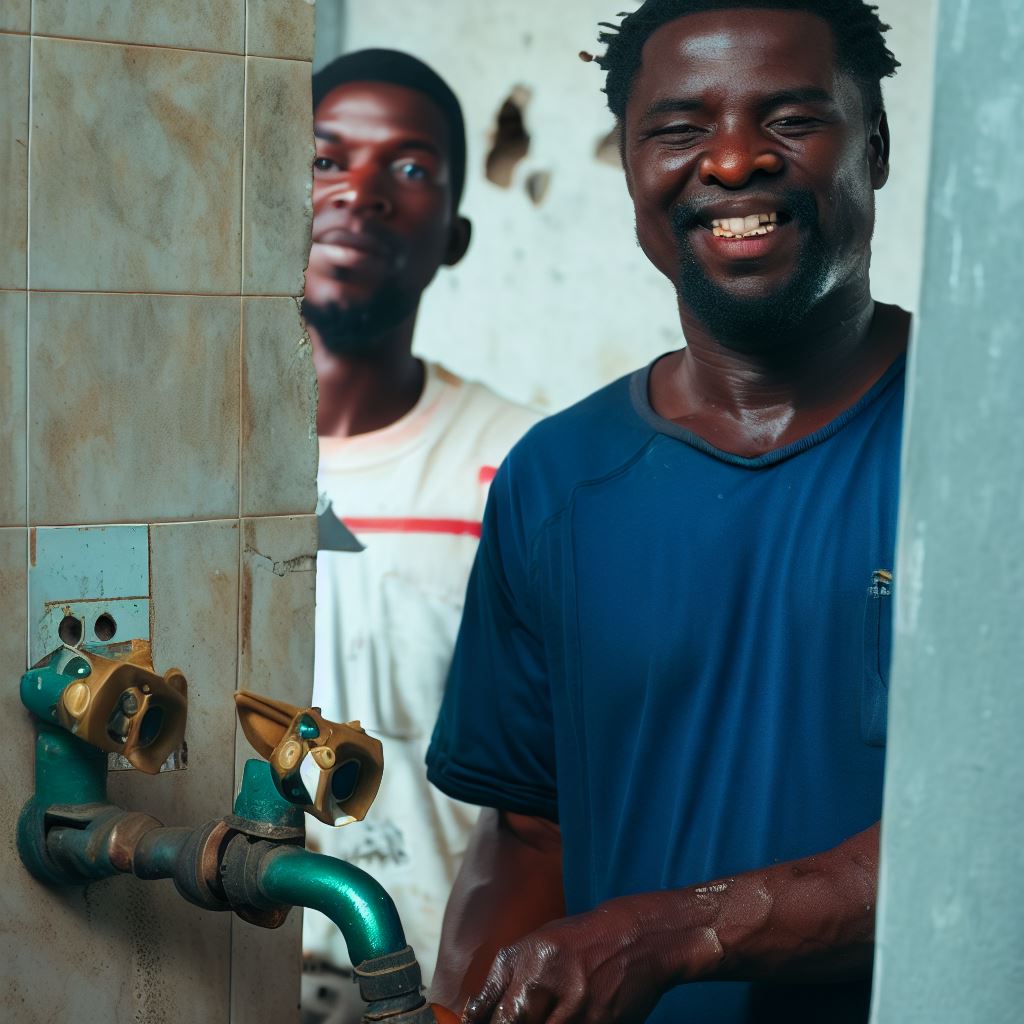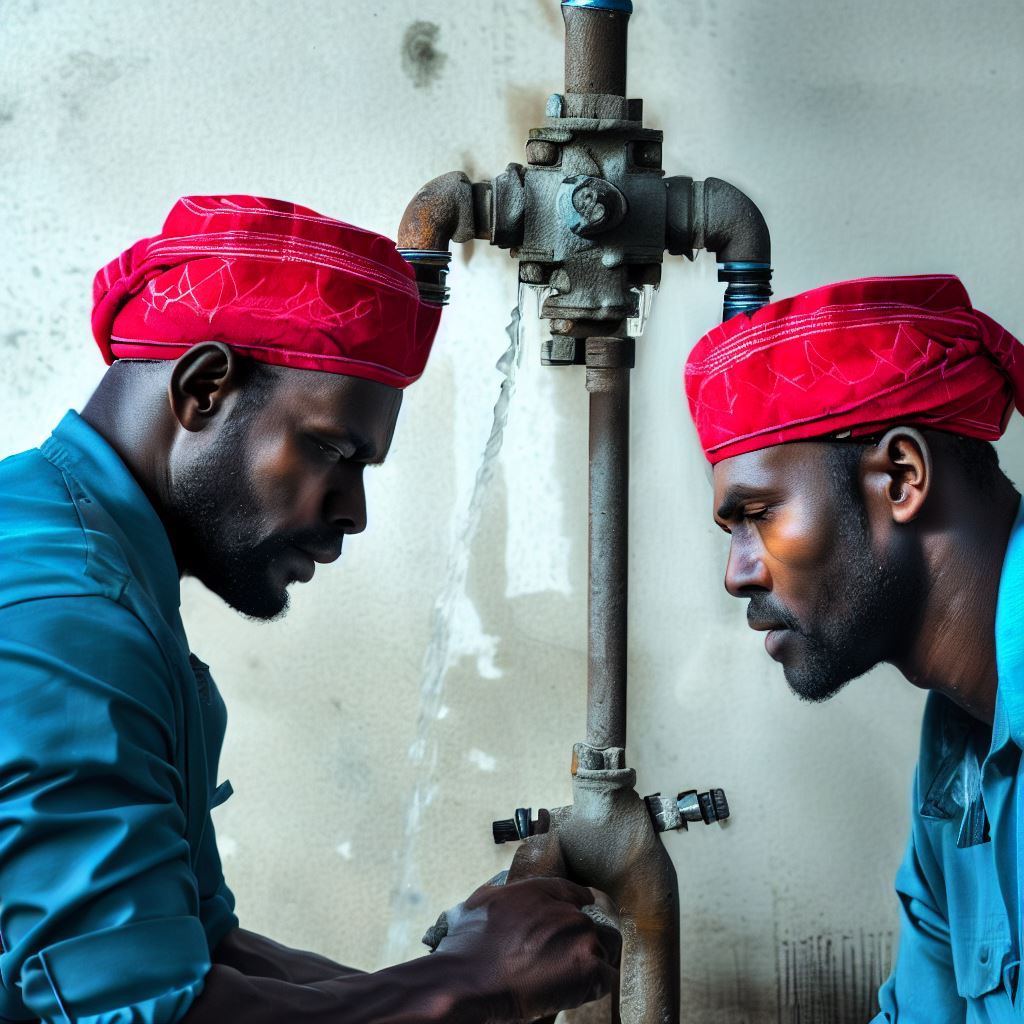Introduction
Let’s explore plumbing regulations in Nigeria: Legal requirements explained.
Plumbing regulations play a crucial role in ensuring the safety and functionality of water supply systems in Nigeria.
This blog post aims to provide a comprehensive explanation of the legal requirements involved in plumbing regulations in the country.
By understanding these regulations, individuals and professionals can adhere to the standards set and contribute to the overall development of safe plumbing practices.
Plumbing regulations in Nigeria are of utmost importance as they safeguard public health and ensure the efficient delivery of clean water.
These regulations establish guidelines for the installation, maintenance, and repair of plumbing systems, preventing potential health hazards.
By following these regulations, the risk of contamination and cross-connections is minimized, promoting a safe and hygienic living environment for all.
The purpose of this blog post is to inform readers about the legal requirements surrounding plumbing in Nigeria.
It aims to educate individuals, homeowners, and professionals on the need to comply with these regulations.
By raising awareness about the importance of plumbing regulations, this blog post seeks to enhance understanding and promote the implementation of safe plumbing practices throughout the country.
In fact, plumbing regulations in Nigeria are essential for public health and the proper functioning of water supply systems.
This blog post serves as a comprehensive guide, shedding light on the legal requirements and emphasizing the significance of adhering to these regulations.
With this knowledge, individuals and professionals can contribute to the improvement of plumbing practices for a safer and healthier Nigeria.
Background on Plumbing Regulations in Nigeria
Plumbing regulations in Nigeria have been established to ensure safety and quality standards in plumbing installations.
The history of plumbing regulations in Nigeria dates back to the colonial era
During this time, the main objective was to regulate the quality of plumbing installations in public buildings.
The enactment of the Lagos State Plumbing Regulations in 2004 marked a significant development in plumbing regulations in Nigeria.
This regulation was aimed at ensuring the safety and quality of plumbing installations within residential and commercial buildings.
Overview of the Establishment and History of Plumbing Regulations
Plumbing regulations in Nigeria have evolved over time to reflect the changing needs and advancements in the industry.
The establishment of plumbing regulations was primarily influenced by the need to address sanitation and public health concerns.
The history of plumbing regulations can be traced back to the provision of the first Lagos Sanitary and Water Supply Ordinance in 1908.
This ordinance aimed to regulate plumbing works and provide guidelines for plumbing practitioners.
Key Government Agencies Involved in Enforcing Plumbing Regulations
The Federal Ministry of Housing and Urban Development is responsible for formulating plumbing regulations at the national level.
The National Plumbing Code Committee is a subsidiary body under the Ministry and is involved in the development and review of plumbing regulations.
State Development Control Agencies are also actively involved in the enforcement of plumbing regulations within their respective states.
These agencies cooperate with professional bodies such as the Nigerian Institute of Plumbing to ensure compliance.
The Lagos State Water Regulatory Commission oversees the implementation and enforcement of plumbing regulations in Lagos State.
Key Requirements of Plumbing Regulations in Nigeria
- Registration: Plumbing practitioners must be registered with the appropriate professional body and obtain a valid license.
- Compliance with Standards: Plumbing installations must conform to the relevant standards, codes, and specifications.
- Qualified Personnel: Plumbing works must be carried out by qualified and competent plumbing practitioners.
- Quality Control: Regular inspections and testing of plumbing installations are required to ensure compliance with regulations.
- Water Supply and Efficiency: Plumbing installations must meet requirements for adequate water supply and water efficiency.
- Waste Management: Proper disposal of waste water and sewage is a fundamental requirement of plumbing regulations.
- Safety Measures: Plumbing installations must incorporate safety features to prevent accidents and ensure user protection.
Benefits of Plumbing Regulations
Plumbing regulations play a crucial role in ensuring the safety and well-being of the public.
They promote standardization, quality control, and professionalism in the plumbing industry.
Compliance with plumbing regulations helps prevent plumbing-related accidents, such as leakages and burst pipes.
Proper implementation of plumbing regulations ensures the efficient use of water resources and reduces wastage.
Plumbing regulations also contribute to environmental sustainability by promoting eco-friendly plumbing practices.
In short, plumbing regulations in Nigeria have a rich history and are essential for ensuring safety, quality, and efficiency in plumbing installations.
The involvement of government agencies, professional bodies, and adherence to key requirements is crucial for effective enforcement.
By complying with these regulations, we can create a safer and more sustainable built environment for all.
Read: Tools of the Trade: Essential Equipment for Nigerian Plumbers
Legal Requirements for Plumbing Professionals in Nigeria
When it comes to plumbing regulations in Nigeria, there are several legal requirements that professionals in the field must adhere to.
These requirements are in place to ensure that plumbing work is carried out safely and efficiently.
In this section, we will discuss the three main legal requirements for plumbing professionals in Nigeria.
Licensing and Certification requirements for Plumbers
Plumbers in Nigeria are required to obtain a license from the relevant government authority.
This license ensures that the plumber has met the necessary standards and qualifications to carry out plumbing work.
Additionally, plumbers must also obtain a certification from a recognized professional plumbing association.
This certification further validates the plumber’s skills and expertise in the field.
Educational Qualifications and Training Programs
In order to become a licensed plumber in Nigeria, individuals must fulfill certain educational qualifications.
These qualifications typically include a minimum of a secondary school education or its equivalent.
Furthermore, aspiring plumbers are required to attend and successfully complete a plumbing training program.
This program equips them with the necessary knowledge and skills to carry out plumbing work effectively and safely.
Importance of Continuous Professional Development
Continuous professional development is crucial for plumbing professionals in Nigeria.
It ensures that plumbers stay up-to-date with the latest advancements in plumbing technology and techniques.
Plumbers are required to participate in regular training and development programs.
This helps them enhance their skills, expand their knowledge, and maintain their professional competence.
By keeping abreast of the latest industry trends, plumbers can provide their clients with high-quality plumbing services.
In essence, plumbing professionals in Nigeria must meet certain legal requirements in order to practice their trade.
These requirements include obtaining licenses and certifications, fulfilling educational qualifications, and engaging in continuous professional development.
By complying with these legal requirements, plumbers can ensure that they are providing safe and reliable plumbing services to the Nigerian population.
Read: Plumber Salary Ranges in Nigeria: A Comprehensive Guide
Plumbing Permits and Inspections
When undertaking any plumbing project in Nigeria, it is important to understand the legal requirements regarding permits and inspections.
Failure to comply with these regulations can lead to serious consequences, both legally and financially.
Obtaining Necessary Permits for Plumbing Projects
Prior to starting any plumbing project, it is essential to obtain the necessary permits from the regulatory authorities.
These permits serve as legal authorization for the construction or modification of plumbing systems.
The process for obtaining permits typically involves submitting detailed plans and specifications of the plumbing project to the relevant regulatory body.
This is done to ensure compliance with safety standards and proper installation practices.
It is important to note that permits are project-specific, meaning that separate permits must be obtained for each plumbing project.
This includes new installations, repairs, upgrades, or modifications to existing plumbing systems.
Failure to obtain the required permits can result in penalties, fines, and even the demolition of unauthorized structures.
It is crucial to follow the proper procedures and obtain the necessary permits to avoid any legal complications.
Types of Inspections Conducted by Regulatory Authorities
Once the plumbing project has been completed, regulatory authorities carry out inspections to ensure compliance with plumbing regulations.
These inspections are conducted at various stages of the project, depending on its complexity.
The first type of inspection is the rough-in inspection, which is performed before walls or fixtures are covered.
This inspection focuses on the initial installation of pipes, drains, vents, and other key components of the plumbing system.
The second type of inspection is the final inspection.
This occurs after all plumbing work has been completed and is ready for use.
The final inspection ensures that everything has been installed correctly and meets the required standards.
During inspections, regulatory authorities assess various aspects of the plumbing project, such as proper pipe sizing, correct configuration of venting systems, and adherence to safety codes.
They also check for any potential health hazards, such as cross-connections or backflow prevention.
Consequences of Non-Compliance with Inspection Requirements
Non-compliance with inspection requirements can have severe consequences for individuals or companies involved in plumbing projects.
Firstly, non-compliance may result in fines or penalties for permit issues or inspection violations.
These fines can be substantial and can significantly impact project budgets and timelines.
In some cases, non-compliance can result in legal action, leading to civil lawsuits or criminal charges.
This can result in further financial losses, damage to reputation, and even imprisonment.
Additionally, buildings and structures found to be non-compliant with plumbing regulations may be subject to closure or eviction orders.
This can disrupt business operations, cause financial losses, and impact the overall safety of occupants.
Lastly, improper plumbing may void insurance coverage for damages.
This can leave individuals or companies liable for any potential damages or repairs.
In general, understanding and adhering to plumbing regulations regarding permits and inspections is crucial in Nigeria.
It is important to obtain the necessary permits for each plumbing project and ensure compliance with safety standards.
Non-compliance can result in significant financial and legal consequences, making it essential to follow all legal requirements and procedures.
Read: Becoming a Plumber in Nigeria: Skills and Training Needed
Publish Your Professional Profile, Business or Brand
Showcase your expertise, gain trust, and boost visibility instantly on Professions.ng.
Publish NowStandards for plumbing materials and equipment
When it comes to plumbing regulations in Nigeria, there are specific legal requirements that govern various aspects of the industry.
One of the essential areas covered in these regulations is the standards for plumbing materials and equipment.
This section will explore the guidelines for proper selection of plumbing materials, regulations on installation and maintenance of plumbing equipment, and the importance of ensuring compliance with safety standards.
Guidelines for proper selection of plumbing materials
Nigerian plumbing material guidelines prioritize high-quality products
These guidelines enforce strict criteria for choosing materials such as pipes, fittings, valves, and fixtures.
Adequate research and information gathering are vital to determine the best materials suitable for specific applications.
Factors considered in the selection process include durability, reliability, resistance to corrosion, compatibility with water quality, and adherence to international quality standards.
It is imperative to choose materials that have been certified by relevant regulatory bodies to guarantee their safety and performance.
Regulations on installation and maintenance of plumbing equipment
The installation and maintenance of plumbing equipment must adhere to strict regulations to ensure the proper functioning of the plumbing systems.
These regulations cover a wide range of aspects, including proper installation techniques, adherence to plumbing codes, and adherence to manufacturer’s instructions.
Only certified, registered plumbers can handle installations and maintenance.
This requirement helps to guarantee the quality of work and protects consumers from substandard installations that could lead to various issues such as leaks, blockages, and contamination of water supply.
Ensuring compliance with safety standards
Safety is of paramount importance in the plumbing industry, and Nigeria has stringent regulations in place to ensure compliance with safety standards.
These regulations aim to protect plumbers, homeowners, and the general public from potential hazards associated with faulty plumbing systems.
Plumbers must follow safety protocols while handling plumbing materials and equipment, especially during installation, repair, and maintenance.
This includes the use of personal protective equipment, adherence to electrical safety standards when dealing with water heaters or pumps, and ensuring proper ventilation in areas with gas-powered systems.
Regulators ensure plumbing safety through regular inspections and certifications.
Non-compliance can result in penalties, fines, or even revocation of licenses for plumbing professionals.
In review, the plumbing regulations in Nigeria regarding standards for materials and equipment are crucial for promoting quality workmanship, protecting public health, and preventing potential hazards.
It is essential for plumbing professionals and consumers to familiarize themselves with these regulations to ensure compliance and maintain the integrity and safety of plumbing systems in the country.
Read: The Demand for Plumbing Services in Nigeria: An Overview

Health and safety regulations in plumbing
Importance of adhering to health and safety regulations
Adhering to health and safety regulations in plumbing is of utmost importance for several reasons:
Preventing water contamination
Plumbing systems play a crucial role in providing clean and safe water to the public.
Adhering to health and safety regulations ensures that the water supply remains uncontaminated, preventing the spread of diseases.
Ensuring public health
By following health and safety regulations, plumbers contribute to the overall well-being of the public.
Proper installation and maintenance of plumbing systems minimize health risks and create a healthier environment.
OSHA guidelines for plumbing worksites
- Personal protective equipment (PPE): Plumbers should wear appropriate safety gear, such as gloves, eye protection, and respiratory masks, to prevent injuries and exposure to harmful substances.
- Safe handling of chemicals: Plumbers should follow proper protocols when working with chemicals, such as using ventilation systems and wearing protective clothing, to minimize the risk of chemical-related accidents.
- Proper tool usage: Plumbers must use tools correctly and ensure they are well-maintained to reduce the risk of injuries. Tools should be inspected regularly for any defects.
- Preventing falls and ergonomic injuries: Adequate safety measures, such as using ladders and scaffolding correctly, should be implemented to prevent falls and ergonomic injuries while working at heights or in awkward positions.
- Electrical safety: Plumbers should have proper knowledge of electrical systems and follow all electrical safety guidelines to avoid electric shocks or fires.
- Proper waste disposal: Plumbers should dispose of waste materials, such as chemicals, debris, and used equipment, in accordance with environmental regulations to prevent pollution and harm to the ecosystem.
In brief, adhering to health and safety regulations in plumbing is critical for preventing water contamination, ensuring public health, and creating a safe working environment.
Plumbers should follow OSHA guidelines for plumbing worksites, including wearing personal protective equipment, using proper tool usage, and practicing proper waste disposal.
Penalties for non-compliance
Violating plumbing regulations in Nigeria can have severe consequences for individuals and businesses alike.
Failure to comply can result in fines, penalties, and legal actions imposed on offenders.
It is crucial to understand the importance of compliance to avoid these repercussions.
The Consequences of Violating Plumbing Regulations in Nigeria
Fines and Penalties
Individuals or businesses found guilty of non-compliance may face substantial fines and penalties.
These can vary depending on the severity of the violation and the discretion of the authorities involved.
Legal Actions
Violators may also be subject to legal actions, which can lead to further financial losses and damage to their reputation.
Legal proceedings can be time-consuming and costly, affecting both personal and professional lives.
The Importance of Compliance
- Safety and Health: Plumbing regulations exist to ensure the safety and health of individuals, as well as the overall well-being of the community. Compliance helps prevent accidents, such as water leaks, sewer backups, or pipe bursts, which can cause property damage and pose health risks.
- Protection of Water Supply: Proper compliance with plumbing regulations helps protect the quality and availability of the water supply. Non-compliant plumbing systems can contaminate water sources, leading to the spread of diseases and public health crises.
- Environmental Conservation: Complying with plumbing regulations promotes environmental conservation. Effective water and waste management systems reduce pollution and minimize the strain on natural resources, preserving the ecosystem for future generations.
- Insurance Coverage: Non-compliance with plumbing regulations may void insurance coverage. In the event of a plumbing-related incident or damage, insurance companies may refuse to compensate individuals or businesses that failed to meet regulatory requirements.
- Professional Reputation: Compliance with plumbing regulations strengthens the professional reputation of individuals and businesses in the industry. It demonstrates a commitment to quality workmanship, ethical practices, and overall professionalism.
Genarally, Failure to comply with plumbing regulations in Nigeria can result in severe consequences, including fines, penalties, legal actions, and reputational damage.
Compliance is vital to ensure safety, protect the environment, and meet legal obligations.
By adhering to these regulations, individuals and businesses can prevent costly repairs, maintain insurance coverage, and uphold their professional reputation.
It is crucial to recognize the significance of compliance and prioritize it in all plumbing-related activities.
Recent developments and future outlook
Updates on any recent changes in plumbing regulations
Here are some updates on recent changes in plumbing regulations in Nigeria:
- The government has implemented stricter standards for plumbing installations in residential and commercial buildings.
- Contractors must be licensed and registered.
- New guidelines have been issued for the installation of renewable energy systems in plumbing systems.
- There are now regulations in place to ensure proper waste management in plumbing systems.
- Higher standards for water efficiency promote sustainability.
Anticipated future developments in the field
Looking ahead, here are some anticipated future developments in the plumbing industry:
- There may be a shift towards more environmentally-friendly plumbing systems, such as rainwater harvesting and greywater recycling.
- Technological advancements may lead to the integration of smart plumbing systems, allowing for remote monitoring and control.
- Enhanced training and certification programs will elevate plumbing standards.
- Expect stricter rules on harmful plumbing materials.
- With the growing population and urbanization in Nigeria, there will likely be an increased demand for plumbing services.
Potential impact on the plumbing industry in Nigeria
These developments and future outlook are expected to have several impacts on the plumbing industry in Nigeria:
- Plumbing contractors will need to invest in continuing education and training to stay updated on the latest regulations and technologies.
- There will be a growing market for eco-friendly plumbing solutions, creating opportunities for businesses specializing in sustainable plumbing.
- The demand for skilled plumbers is expected to rise, leading to potential job opportunities and career growth in the industry.
- Plumbing companies may need to adapt their business models to incorporate new technologies and services.
- Improved regulations and standards will help ensure the safety and quality of plumbing installations, protecting consumers and the environment.
Basically, recent developments in plumbing regulations have aimed to improve standards, promote sustainability, and protect public health.
The Nigerian plumbing industry is set for growth and innovation, driven by tech advancements and eco-focus.
Conclusion
This blog post has discussed the plumbing regulations in Nigeria and their legal requirements.
Several key points have been highlighted throughout this section, including the need for certified plumbers, adherence to safety standards, and obtaining permits for plumbing projects.
It is crucial to emphasize the significance of complying with plumbing regulations, as it ensures the safety of individuals and the integrity of buildings.
Non-compliance can lead to costly repairs, health hazards, and legal consequences.
Therefore, it is strongly recommended that readers seek professional assistance for their plumbing projects.
Hiring a licensed plumber ensures correct, regulated work.
Professional plumbers have the necessary expertise and experience to handle various plumbing tasks efficiently and safely.
By engaging a licensed plumber, readers can have peace of mind knowing that their plumbing projects are in capable hands.
Understanding and following plumbing regulations is essential for both the well-being of individuals and the overall integrity of buildings.
Seeking professional assistance ensures compliance and guarantees the quality of plumbing work.




